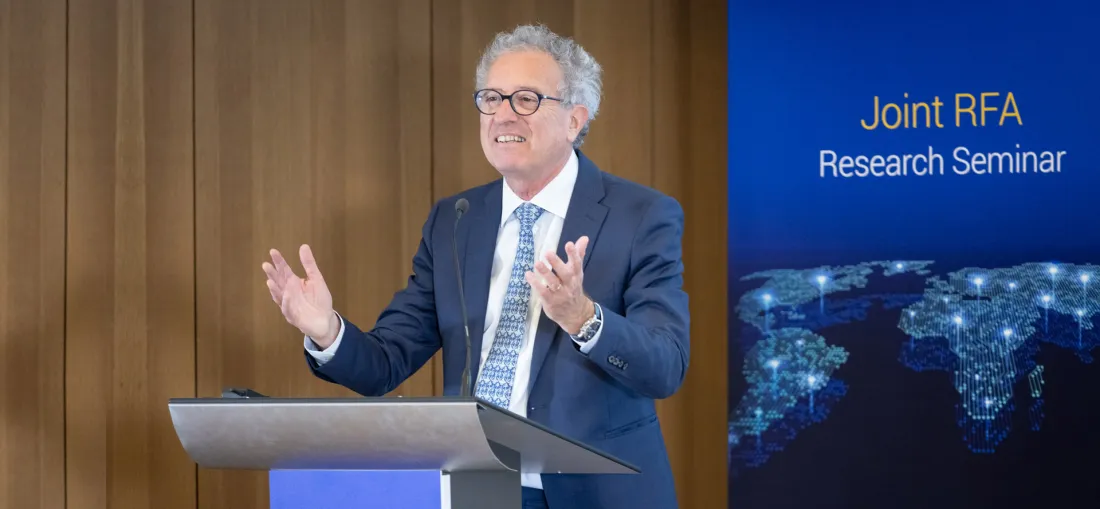The new reality of geo-economic fragmentation - speech by Pierre Gramegna

Pierre Gramegna, ESM Managing Director
“The new reality of geo-economic fragmentation”
Opening remarks at 8th Joint RFA Research Seminar
Luxembourg, 16 May 2024
(Please check against delivery)
Ladies and gentlemen, good morning.
I am delighted to welcome all the experts, researchers and academics, gathered here in Luxembourg for the 8th Joint Regional Financing Arrangements (RFAs) Research Seminar in the headquarters of the State savings bank of Luxembourg, which is one of the most beautiful buildings of Luxembourg City and used to be the headquarters of Arcelor Mittal.
A special thank you to our colleagues from the ASEAN+3 Macroeconomic Research Office (AMRO) and the Latin American Reserve Fund (FLAR), who have co-organised this seminar together with the ESM. We are pleased to have the Chief Economists from both institutions: Hoe Ee Khor from AMRO and Carlos Giraldo from FLAR.
I would like to thank ESM Secretary General Nicola Giammarioli and his team who have coordinated everything for the event. And I salute the Chief Economists of other RFAs, present here: Maher Hasan from the Arab Monetary Fund, and Sergey Ulatov from the Eurasian Fund for Stabilization and Development. We are also glad to have with us Anna Ilyina, Assistant Director of the SPR [Strategy, Policy and Review] Department of the IMF.
A warm welcome also to the representatives from many other international organisations and institutions: the WTO, OECD, World Bank, European Commission, and Asian Development Bank, in person and online.
Last but not least, I welcome representatives from central banks, universities, think tanks, and the private sector.
Importance of the RFA Research Seminar
The Research Seminar is one of two annual events organised by RFAs, the other being the High-level Dialogue of the heads of RFAs, held in Washington on the occasion of the IMF Meetings.
The Seminar was created as a platform where technical experts could share and discuss research work directly related to RFAs’ operations on crisis prevention and resolution. The findings and conclusions help us improve RFA’s surveillance and crisis management capacities.
In addition, seminars of this kind bring a special added value – they provide a regional perspective concerning topics that are crucial for global financial stability. This year, the Seminar focuses on the multiple risks associated with global fragmentation. This is a topic that I think will stay with us for quite some time.
The relevance of geo-economic fragmentation
The global economy may be on the brink of a reversal of the steady increase in global economic integration that characterised the second half of the 20th century. Integration brought more economic growth and prosperity in many countries across the world.
However, the decades of deepening integration have made the world more interconnected and interdependent.
I would like to highlight that thanks to globalisation, we have had a double virtuous circle.
First, globalisation means more international trade. And more trade brings more growth to both the one who buys goods or services, as well as to the one who sells.
The second virtuous circle is that the more growth you have, the more commerce you have, the more the world is interconnected, the greater the chance to reduce wars. So, for me, globalisation means more trade and less war.
Now we have entered a phase where we have seen many vulnerabilities and disruptions because this trend has changed.
Such disruptions may affect the flow of goods, services, technology, capital, and what is also important – the flow of people. These are, incidentally, the four freedoms that we have in the EU Single Market – the free flow of goods, services, capital and people. There are emerging signs that these flows are being redirected along geopolitical lines. And in the new era of geo-economic fragmentation, the vulnerabilities can materialise in ways that have a detrimental impact on the global economic landscape.
We are seeing different types of risks, such as:
- Reduced economic growth,
- Threats to financial stability,
- Disruption of global trade and supply chains,
- And more wars.
Protectionism is on the rise. This leads us to a question, to which I don’t have the answer: Is protectionism the driver of deglobalisation, or the consequence of deglobalisation? I would keep that question in mind during the seminar, because knowing the source of protectionism could help us reduce it.
Speaking about trade, in a recent speech, First Deputy IMF Managing Director Gita Gopinath noted that the number of new trade restrictions has increased sharply in the last few years. They have more than tripled since 2019.
Let me give you another number, which illustrates what I was saying about war and trade.
Before World War I, the trade openness index, which is a ratio of trade to GDP1 , was at 29%. In between the two World Wars, that ratio never reached 29% again. For me, this is an explanation why we had World War II. At the end of World War II, the ratio was down to some 10%. By 1980, we were at 35%, so above the level of 1914. You can say it took us almost 70 years to return to the level of 1914.
And then there was a spectacular acceleration; the ratio of trade to GDP reached 53% by 2010. From 2010 to 2020, the ratio fluctuated near that level, but since 2021, the ratio fell from 51% in 2021 to 43% in 2023. This was a major decline in just two years.
Another measure of the trade slowdown is a decline in the volume of world merchandise trade by 1.2%, after recording an increase of 3% in 2022. We had not seen that for a long time, probably with the exception of the Covid years.
Economic fragmentation is also impacted by the numerous armed conflicts around the world: there are currently more than 110 armed conflicts, on all continents with the exception of Australia.2
Taking all these negative effects into consideration, is it possible to estimate the economic costs of fragmentation? According to IMF calculations, in a mild scenario with low adjustment costs, losses resulting from fragmentation could amount to 0.2% of world GDP. However, in an extreme trade fragmentation scenario, with limited ability of economies to adjust, losses could be as high as 7% of global GDP.3
We can see that we are dealing with a new reality. New terms have been coined - we hear about decoupling [the process of reducing economic interdependence between countries], reshoring or near-shoring [moving manufacturing and services back to a home country or closer to it, and friend-shoring [relocating supply chains and investments to trusted countries with shared values and interests, as opposed to relying on geopolitically adversarial nations].
These new terms symbolise a paradigm shift in the global economic landscape, a shift towards more regionalisation. We see that countries are increasingly prioritising strategic considerations such as national security, technological supremacy, and economic self-sufficiency. To avert runaway fragmentation, the rules-based multilateral system must adapt to the changing world.
Multilateral efforts should be continued and, where possible, stepped up in areas of common interest, such as climate change, mitigation, food security, pandemic preparedness, and debt issues. This is what we are doing here together - mending the fragmentation. It is essential for making progress and addressing global challenges effectively. It is crucial for all parties to work together to prevent current tensions from boiling over into further geopolitical crises.
The 2024 RFAs Research Seminar - overview
Allow me to conclude by saying a few words about the structure of today’s Seminar. To better understand the multiple risks associated with global fragmentation, this Seminar has been designed to examine different aspects of the topic matter. In a moment, we will hear the opening presentation on geo-economic fragmentation by Anna Ilyna from the IMF.
This will be followed by three sessions, which focus on:
- The tools and methodologies used for measuring and detecting fragmentation risks;
- The regional impact of geopolitics on trade, supply chains and economic stability;
- The financial implications of fragmentation.
Afterwards, there will be a policy roundtable where the participants will discuss strategies and policies for mitigating the risks posed by fragmentation.
I am confident that, through in-depth discussions and the sharing of insights, this Seminar will contribute to a deeper understanding of the challenges posed by global fragmentation. This will allow RFAs to enhance global and regional resilience, which is at the centre of their mandates.
I wish you all a productive and successful seminar.
Thank you for your attention.
1 The global trade openness index is defined as the sum of world imports and exports of goods divided by world GDP.
2 Source: Geneva Academy of International Humanitarian Law.
3 Speech: Geopolitics and its Impact on Global Trade and the Dollar (imf.org)
Author

Contacts


